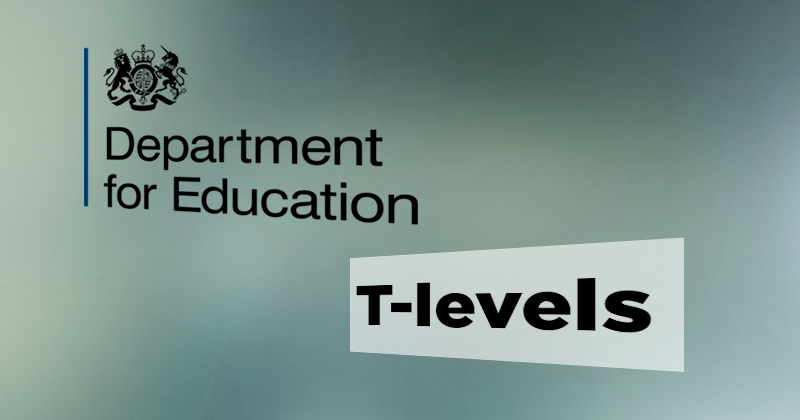LORD AGNEW: LETTER TO ALL SCHOOLS IN ENGLAND

LORD AGNEW: CALLING FOR SCHOOLS TO URGENTLY GIVE ACCESS TO ORGANISATIONS PUSHING ALTERNATIVES TO A-LEVELS SO THAT TEENAGERS CAN MAKE THE RIGHT CHOICES
At a time of major transformation in our education and employment systems, young people and parents/carers need access to high-quality careers information, advice and guidance.
The Organisation for Economic Cooperation and Development (OECD) argues strongly for schools to begin career guidance early and for it to include exposure to the world of work.[1] Government policy in England is in a dilemma! On the one hand, it urges school leaders and teachers to do more to help young people understand the full range of options available to them, to embed careers in the curriculum and to ensure T levels are fully understood and gain equal status to A levels. This is a BIG ASK and an over-simplistic view of what’s needed to ensure T levels are a success. Young people need access to impartial and independent career guidance to help them make good sense of the differing pathways and choices that lie ahead.
On the other hand, the government funded Careers and Enterprise Company set up to be “strategic” and “motivational” is tasked to lend support to embed Gatsby Benchmarks in all local schools and colleges. Whilst there are examples of great work by Enterprise Co-ordinators and volunteers and those agencies who have succeeded in accessing CEC funds at a local level, many young people and families (particularly those most vulnerable) have inequitable access to career guidance.
Career guidance enables young people to get the best return they can on the education they have received and is associated with higher levels of academic achievement and motivation.
I intend to write to Lord Agnew to remind him of the international evidence base is clear career education/ career guidance/ yields significant returns on investment for the individual, local communities and our economy. There are many other academic works which show returns on investment (RoI). LET ME NOW YOUR THOUGHTS. Do send me any examples which you like to refer to when it comes to showing career education and/or career guidance impact and RoI. Email: [email protected]
[1] OECD Education Working Paper No.175 (2018) Working it Out: Career Guidance and Employer Engagement https://dmhassociates.org/wp-content/uploads/2018/07/OECD_Guidance-and-employers.pdf

Lord Agnew Kt DL
Parliamentary Under-Secretary of State for the School System
Sanctuary Buildings Great Smith Street Westminster London SW1P 3BT
Dear Colleague,
SCHOOLS’ COMPLIANCE WITH THE ‘BAKER CLAUSE’
Our reforms to technical education are giving young people access to high-quality training and qualifications that match traditional academic routes. You have a crucial role to play in ensuring young people can hear directly from providers of technical education to build up a full picture of the options available to them.
As headteacher, you are under a statutory duty to publish a policy statement setting out details of the opportunities for providers of technical education and apprenticeships to visit your school/s to talk to all year 8-13 pupils, and to make sure the statement is followed. I am grateful that many schools are taking steps to comply with this legislation, commonly known as the ‘Baker Clause’. However, too many young people are still not given the chance to learn of different environments open to them and find out if technical education is right for them.
I urge you to take action this term to open your doors to University Technical Colleges, FE colleges, apprenticeship providers and new Institutes of Technology. Now is the crucial moment when so many young people are thinking about their options for September. I recognise it can be challenging, particularly when schools have their own post-16 offer. But we all have a responsibility to support young people to make choices based on their skills, interests and aspirations.
His warning comes after a report by the National Foundation for Educational Research (NFER) in December found there was still “significant work to do” to raise awareness of T-levels amongst students.
Geoff Barton, General Secretary of the Association of School and College Leaders (ASCL), said: “Schools are aware that they need to give pupils as much information as possible about future courses and careers and we have circulated guidance about the requirements in the Baker Clause.
“However, the wider problem is that the government has failed to invest sufficiently in the provision of high-quality careers information and advice.”
On Friday, the government announced that T-level providers would benefit from a £110m package of support to ensure they are ready to deliver the new courses.
The first three T-levels, in education, digital studies and construction, are due to be taught in 50 providers, of which the majority are colleges, in England from September. Seven more courses will be on offer from 2021 and the remaining 15 will be launched in 2022 and 2023.
